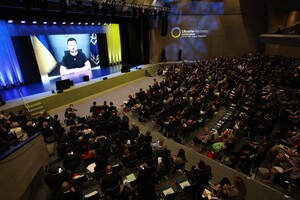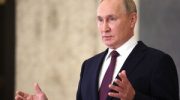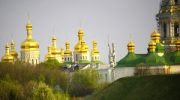At the conference on the restoration of Ukraine in Lugano, there were both supporters and opponents of the idea of transferring the frozen assets of the aggressor state — the Russian Federation in favor of Ukraine as a victim of unmotivated aggression.

Proposals on confiscation of frozen Russian assets in the amount $500 billion to finance the reconstruction of Ukraine met with strong resistance from Switzerland, where an international two-day conference on the revival of Ukraine is taking place, reports The Guardian.
Read also: The head of the British Foreign Ministry announced the Marshall Plan for of Ukraine
Swiss President Ignatius Cassis opposed the plan in the process. According to him, the protection of property rights is fundamental in a liberal democracy. At the final press conference in Lugano, he emphasized that some leaders seriously fear that the proposals to confiscate Russian assets will set a dangerous precedent and therefore require concrete legal justification.
“The right to property, the right to property is fundamental. a right, a human right,” he said, adding that such rights can be violated, but only if there is a legal basis.
Switzerland is one of many countries with tough bank secrecy laws that are unenthusiastic refers to the expropriation of private property for political purposes.
For her part, the head of the British Foreign Ministry, Liz Truss, supported the idea of confiscating the frozen assets of the aggressor, that is, the Russian Federation, in favor of Ukraine.
Read also: The British Foreign Ministry initiated the confiscation of Russian assets and their transfer to victims of the war in Ukraine
In turn, the Prime Minister of Ukraine Denys Shmyhal admitted that this is only the beginning of the discussion. “We propose to find a formula for the creation of national and international legislation for the possibility of confiscation of frozen assets in case of unprovoked aggression, which will be the rule,” he said.
“We as a country that is a victim of unprovoked aggression will be very loudly declare this possibility, because we understand that the aggressor who kills our people, destroys our infrastructure, our schools, our hospitals must pay for it,” he emphasized. Shmigal.
He also noted that Russian assets in the amount of $300 to $500 billion have been frozen around the world.
In April, the Swiss Confederation's State Secretariat for Economic Affairs (SECO) announced a freeze on Russian assets worth 9.7 billion Swiss francs, but some of that money has since been unblocked. One of the contentious issues is the extent to which family members of a sanctioned oligarch can retain property in Switzerland.
We will remind you that we previously reported that even after Bern mirrored all the sanctions implemented by the USA and the EU against Russian oligarchs (and there are currently approximately 900 people on this list worldwide), Russians are currently frozen in Switzerland assets of only some 8 billion dollars or 7.7 billion Swiss francs.
For comparison, on the island of Jersey, the geographical coordinates of which few people know, 7 billion dollars of assets associated with only one Russian tycoon have been frozen Roman Abramovich.
Swiss Banking Association (Schweizerische Bankiervereinigung SBVg) recently calculated that in general about 150-200 billion Swiss francs ($155-207 billion) of Russian money are kept in Swiss banks.
Representatives of more than four dozen countries and two dozen international organizations, such as the European Investment Bank and The Organization for Economic Cooperation and Development (OECD) signed today, based on the results of two days of consultations held in the city of Lugano in the canton of Ticino, the so-called “Declaration of Lugano”.
In the final document, the Conference participants set out seven criteria for the revival of Ukraine, including combating corruption, commitment to democratic values, ensuring a transparent and accountable style of governing the country, development of basic human rights and freedoms and citizen The summit was organized by Swiss President Ignatius Cassis and Ukrainian Prime Minister Denys Shmyhal.
European Commission President Ursula von der Leyen participated in its work personally, Ukrainian President Volodymyr Zelenskyy spoke at the conference online.
p>


